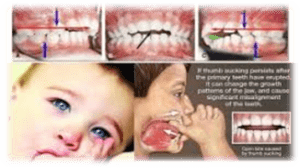Thumb Sucking: Causes, Effects, and Solutions for Parents
- Dr Owais Rafiq
- August 12, 2024
- 5:31 am

All about thumb sucking in children: Pleasure, Pain, and Neutral state.
Parents are usually quite concerned with the oral health of their children. They may ask themselves whether thumb-sucking is beneficial for them or to what extent it is harmful to their kids. Every parent has so many questions that something in their head about how to wean their child from such a habit. Almost 85-90% of kids suck their thumb during their childhood as it is natural for a kid to do so. We can move to the article to find out when it becomes an issue and how one can best support the child.

THUMB SUCKING IN CHILDREN: NORMAL OR NOT?
Thumb sucking is a common behavior among young children, often beginning in infancy and continuing into the toddler years. While this habit is typically harmless and may even serve as a source of comfort, it can potentially lead to dental issues if it persists beyond the age of 4. Parents should be aware of the potential consequences of prolonged thumb sucking and work with their child’s dentist to address the behavior if necessary.

Thumb sucking in children, particularly in babies and toddlers, is completely harmless. Children like to put things and fingers in their mouth as part of exploring, adapting, and accommodating information necessary for their growth Furthermore, a few kids use thumb-sucking as a solace source, and some might utilize soft toys or a cover. It is a part of the normal developmental process.
According to statistics, children often stop this behavior on their own between the ages of two and four. They usually engage in such behavior when they are stressed, anxious or settling down before sleep.
REASONS OF THUMB-SUCKING IN CHILDREN: –
This is a common normal reflex action. From the gestation period, babies develop the habit of putting their thumbs and fingers in the mouth. This action makes them feel secure, guarded, and a source of comfort. Because of these babies used to develop the habit of thumb-sucking when they needed soothing or going to bed.
DIFFERENT ANGELS TO THUMB SUCKING IN CHILDREN: –
We must examine the following aspects of thumb sucking in children to determine whether it is harmful or not:
-
Age: –
By the age of three to four years kids become aware of what is good or bad for them. Hence, they stop sucking their thumb automatically. However, by the age of four, the changes to the jaw will not correct itself. So, it is important to stop them sucking their thumbs before their grown-up teeth come in.
-
Frequency:
–
How often does your child suck his/her thumb? Do they keep on sucking all day or just at bedtime or nap time? This will make parents understand how to prevent their child from more damage.
-
Duration: –
Determine how long your kids are sucking their thumbs. Are they doing it for 5-10 minutes only to fall asleep? If yes, it means they are not doing much damage to themselves.
-
Intensity: –
With how much intensity your kid is sucking their thumb? The more intensely they suck the thumb the more damage they are causing than doing it loosely.
NEGATIVE RESULT OF THUMB-SUCKING IN CHILDREN:
Sucking thumb for longer time can lead to following problems, Thumb sucking in children can have several adverse effects. Prolonged thumb sucking can lead to dental issues, such as misalignment of teeth and improper jaw development. Additionally, it may also affect speech development and lead to social stigma among peers. It is important for parents to address this habit early on to prevent these potential problems. Thumb sucking in children can have several adverse effects. Prolonged thumb sucking can lead to dental issues, such as misalignment of teeth and improper jaw development. Additionally, it may also affect speech development and lead to social stigma among peers. It is important for parents to address this habit early on.
- Speech problems.
- Misaligned teeth Title: Thumb sucking in children Thumb sucking in children is a common behavior observed in the early stages of development. Despite its prevalence, prolonged thumb sucking can lead to potential issues such as misaligned teeth. It is essential to address this habit early on to prevent any long-term dental complications.
- The gap between teeth.
- Difficulty, chewing and swallowing.
- Misaligned bite.
- Trolling and teasing by school fellows that could harm their confidence.
WHEN INTERFERENCE BY PARENT IS APPROPRIATE?
In most cases, thumb sucking does not cause much harm until the child gets his/her permanent teeth. It is at this stage that thumb sucking may cause harm to maxilla or the palate which is the roof of the mouth or even the alignment of the teeth. Some researchers pointed out that the frequency, duration and intensity of thumb sucking is the direct indicator of the dental problems your child may face in the future.
SIX WAYS TO WAEN OFF THUMB-SUCKING IN CHILDREN
The following are some of the measures that can be helpful in stopping your child from sucking his/her thumb:
-
Prefer positive reinforcement over punishment: –
Forcing your child to stop sucking their thumb is not an innovative idea. It will only create stress and anxiety in them and that will increase their urge to suck more thumbs as anxiety and stress are one of the probable reasons behind it. Reinforcing positive behaviors is more effective and recommended. Let them understand by love and care and implement strategies in which they will lose interest in thumb-sucking.
-
Offer them healthy alternatives to replace their coping mechanisms: –
Offer your child soft toys, give them their favorite blanket, and involve them in some arts and crafts. In this way, they will start forgetting about sucking their thumb slowly and start living a normal life.
-
Discuss the effects of sucking thumb: –
Discuss the potential side effects of thumb sucking with your child if they are old enough. You might be able to use pictures of misaligned teeth as visual aids. Use moderate examples and contrast them with positive examples of lovely, healthy smiles, however, to prevent it from becoming a “scare” talk.
-
Provide gentle reminders: –
If thumb sucking in children becomes a habit, it is easy for any child to do it without even realizing it, just like anyone who has ever had a bad habit will realize. Prior to starting the challenged habit, it is effective to prevent it by offering them some reminders.
-
Use of thumb-sucking guards: –
Thumb sucking in children can be harder to prevent at night because parents are not able to monitor their children at night. So, it is better to use hand gloves, bitter lotion, nail polishes, or thumb sucking guards to put on your child’s thumb to discourage them.
-
Ask for help from an expert: –
Consult your pediatrician or dentist for advice if you are having trouble making healthy changes on your own. They can offer you master tips on overseeing ways of behaving like thumb sucking, and they might have the option to suggest a dental machine or other item that can help.
WHAT IF NOTHING WORKS?
In some cases, children really have a hard time, where they simply cannot quit sucking their thumbs. Try not to worry. Putting too much pressure on your child to stop thumb-sucking might only delay the process.
Thumb sucking in children is a common habit observed during early childhood. It typically involves a child placing their thumb in their mouth and sucking on it for comfort or self-soothing purposes. While thumb sucking is considered normal in infants, prolonged thumb sucking can have potential implications on dental health and speech development. It is essential for parents to understand the reasons behind thumb sucking, implement appropriate strategies to discourage the habit, and seek professional advice if necessary. By addressing thumb sucking in children at an early stage, parents can help promote healthy oral habits and overall development in their child.
Dr Owais Rafiq
Subscribe to Dr Owais YouTube channel
For parenting advice, child health, symptoms, causes and treatment of illness in children.






